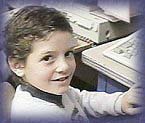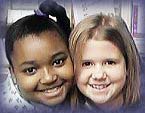
begin
with
the
children

 |
| We begin with the children |
 |
Summer Planningfor Aiea Complex Technology TrainingWhat we hope to do is:
Joy Saito, Chairperson - Tech Coordinator of Webling Elementary According to a recent survey and assessment, the major needs of classroom teachers include:
Patti: I am a Title 1 Computer teacher at Delmar where I have been doing online activities with my students in grades 1-4 and some 5th and 6th graders who come to me on their own free time at recess. The story is here: http://www.globalclassroom.org/howwedo.html Once you see this page be sure to click on "home" and go back and take a tour of my "Global Classroom" to see what kinds of things I have been doing with my students. http://www.globalclassroom.org I have been doing volunteer work with KIDLINK since 1992 and am the Manager of the global project area called KIDPROJ: http://www.kidlink.org/KIDPROJ Because of my KIDLINK work I have met fantastic people all over the world and have had the pleasure of traveling to London, Brazil, Hawaii and Demark where I joined other KIDLINKers and gave workshops and presentations for teachers about KIDLINK and how I use the Internet with my students.
Darrel: Then based on what little we have shared, what are your initial thoughts on how we can maximize the use of your services from July 6-10 ? Patti: Since my own school has not had computers and software such as PowerPoint I have had to do all that we do with very little - a word processor. I was making our Global Classroom web site for months before the students ever saw it. We didn't have a computer new enough to run Netscape. We were dialing in to our provider with ProComm+ for many years. I think if you look through my web pages you'll see how I take simple curriculum objectives and use the Internet to make them real and more exciting. Here is one example. My students in grade two were making 25 cents in as many ways as they could. Look how I made it an international adventure: http://www.globalclassroom.org/gisli3j.html I enjoy helping teachers see new ways to enhance their lessons by adding a global dimension. Because my school has had very little hardware I am living proof that you don't need that much to make this kind of thing happen. Notepad and a modem are all we need. I just replied to a group of teachers/mentors from Brazil, Israel, South Africa, the UK, Hawaii and Portugal who are working with me on a new project plan. A thought came to mind...connections... that's a big part of what I can offer you and your teachers this summer. My KIDLINK work has built a database of people everywhere. Project planning is what I do all the time with KIDLINK folks. I would be able to share ways to moderate a global project. Darrel: I'll continue to try and facilitate our discussion by posing questions such as: What are your thoughts/suggestions as far as what teachers can leave the summer training experience with? For example, is it possible for teacher to bring to the training a unit plan or lesson plans which they can revise or rewrite to include the use of new technology tools and resources? Patti: This is an excellent idea. I am planning a new course for staff development in our county that is called, "Internet and Curriculum Connections" where I will work with a group of teachers and help them develop lessons and/or projects that include some kind of online activity. Some teachers are still very hesitant to use online connections so we can suggest various models to ease them into it:
http://www.globalclassroom.org/hess.html Don't miss these pages that show the kids with the men when they visited us: http://www.globalclassroom.org/dhvisit.html http://www.globalclassroom.org/mnvisit.html http://www.globalclassroom.org/mattboys.html The last one will bring a lump in your throat. My summer school kids wrote to Dave and Matt and became very close to Matt who was having a rough time in the long dark night (3 months) in Antarctica. When Matt came to Delmar we went to several schools to get these boys. One was in Alternative School for his behavior. See the web page.... ;-) Marilyn: Patti, I can see much potential if the teachers came with their unit plans as this is what all of the elementary schools in the Aiea complex have been working on through Success Compact. To add the www as a resource would make the units that much richer. Showing teachers how the www can be used as a resource would be so impactful. Not only is it a source for so much information but it also becomes a way to develop critical thinking as not all web sites offer pertinent or appropriate information. Through our Landmark game and Thinkquest Jr., this became very apparent as students did their web searches and found sites that had nothing to do with their topic. Adding to existing units during the summer is so ideal as using the www does take time. Patti: Marilyn, good point. Is the information accurate? This is another important issue. "I found it on the Web, Mrs. Weeg, so it must be true!" Hmmm... not necessarily. Do any of the schools have time in the school day for grade level planning or a time when all the math (or all science) teachers can get together? We have been begging for grade level planning in our schedule and this year I think a few teams have this. It is a common planning time once a cycle (every 6 days) when teachers on a grade level can meet during the school day. Coordinating a unit across content areas is enhanced with this kind of time. Time. We never have enough time, do we? ;-) Yes, I think a rubric would be good and I also think that the students can make their own rubrics as a class for activities within the unit. For instance: The online project is a new one about volcanoes (Lynne's project - "Volcanoes -- World Under Construction) and the students are asked to:
from the Volcano project web page Activities: 1. Adopt a volcano: Pick a volcano you would like to learn about about and share with participants. Get to know your volcano...and, like any proud parent, become an expert on it!
The students could build their own rubric around these 4 prompts. Here they are writing to inform. Science and Math classes can get involved in the location - latitude and longitude, time zones, etc. I can see all kinds of writing possibilities as well as the obvious science, math and social studies. Rubric for 1. above:
4 points - Students corrrectly identify latitude, longitude, type and
eruptions Darrel: Or could we come up with a rubric of some type which we can have teachers use to assess their lesson plans or unit plans as far as whether technology is being used effectively in them? Patti: another great idea. ;-) My four scenarios above could be expanded and adapted into a rubric. Marilyn: This would be so appropiate especially if there is movement towards performance based assessments. Darrel: Or can we have a "celebration/sharing day" on the last day where teachers will share with others what they have worked on - both a presentation and hard copies Patti: I don't think this is an "or." I am hoping we can do this and look forward to it. Darrel: (or even a website) for the rest to take away with them? Patti: website ;-) Now you're talking my style. My name is Patti WWW.eeg [so I have been dubbed by a friend] I'm not sure if one week is enough time to do all of this unless we divide the tasks and have some teachers making web pages as their lessons and projects develop. ...maybe something like this: (just a thought) a team of four:
Darrel: If we can begin to look at what we hope teachers will take away from the experience, I think that maybe we can then plan how to get there. What do you think? and for the tech committee members -- what are your ideas here? Marilyn: I like the idea of a celebration and a sharing. In a week, it might not give us enough time to plant the seed, watch it germinate, grow and become a full fledged plant. It would be awesome if this could happen being that the teachers may not have the luxury of actually working with students and being able to share their actual products. Patti: I'm reminded of a quote I read... It is something like this: To make a garden happen we can't just pull weeds; we have to make something grow. I love this and have it hanging on the wall in my lab. Yes, we have "weeds"...
At the beginning of our week I think it is important to focus on the kids. What are their needs? What weaknesses do they have and how can we make them better using technology? We need to look at your Hawaii Content and Performance Standards. I will always insist that there are ways to bring your curriculum objectives into nearly all online projects. Look at this page and see how things can something fall into place without any plan at all. ;-) http://www.globalclassroom.org/contract.html Marilyn: I agree with the above completely. We need to start with the kids and where they are coming from. Patti: Absolutely. The curriculum guides and needs of the kids must drive the technology and not the other way around. The computer is a tool, not a teacher, and we, as teachers, still know what is best for our kids. We know their needs. *But* I really believe that we can use this tool to meet their needs. This is a page from last year's summer school (Lynne Sueoka's kids were writing to mine during this time as well!) which shows an exchange between an 8 year old boy with leukemia and his mentor in the UK who has MS. It was wonderful and I couldn't have planned it any better if I had planned it at all. You can see the rest of the summer school pages and several of your students from the Dole summer school where I visited last summer. |